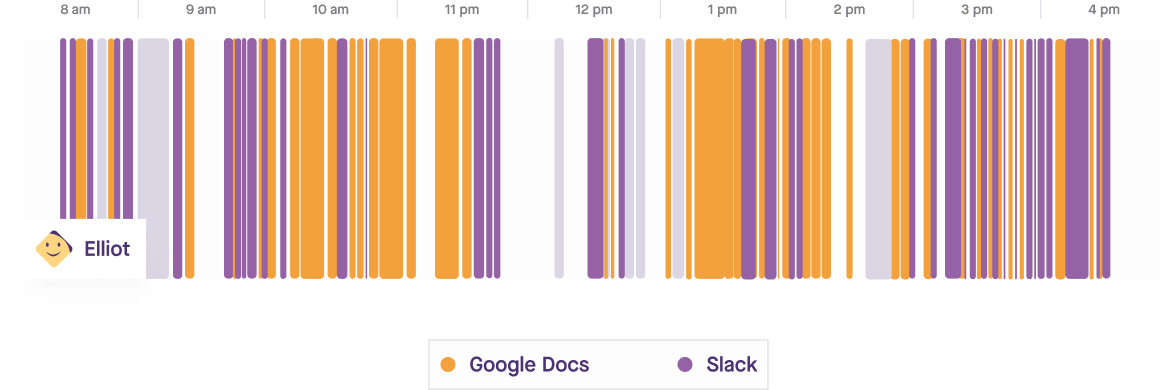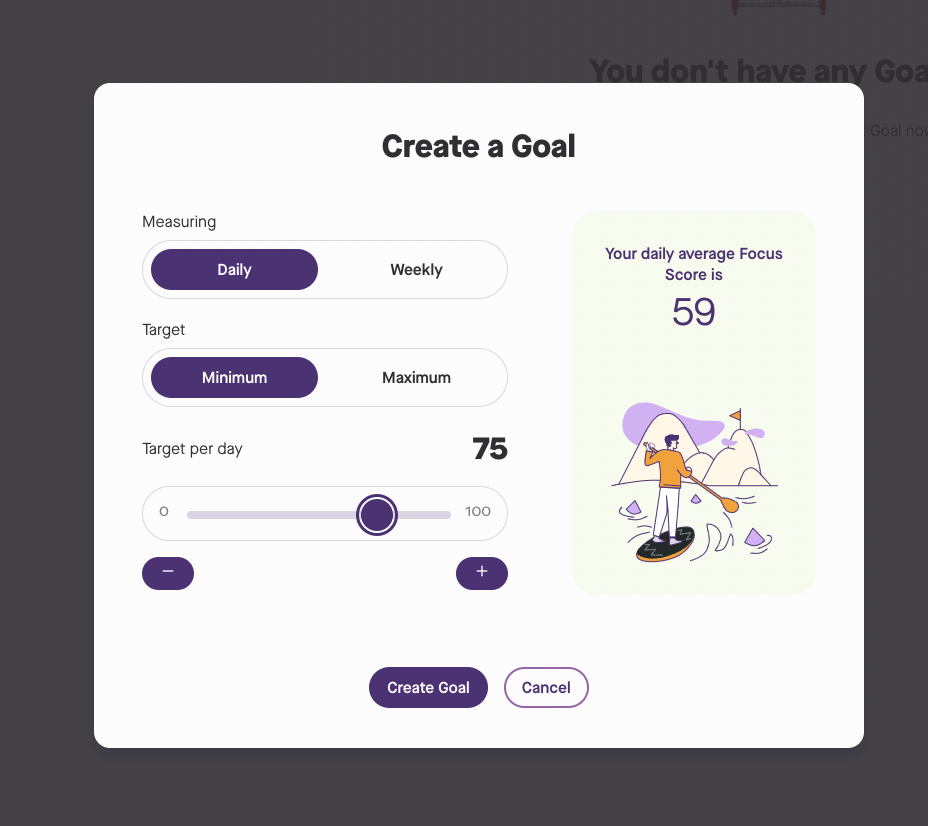Digital Work Analytics reporting
Reclaim Your Attention With 8 Key Takeaways from Johann Hari's “Stolen Focus”
We at Produce8 are big fans of books! One that inspired us is “Stolen Focus: Why You Can’t Pay Attention” by Johann Hari.
In it, Hari dives deep into the world of distractions and provides insights into how to reclaim our focus. By understanding what causes us to lose our focus, we can make changes to better ensure that what we are doing is aligned with our personal, team, and organizational goals — and more importantly, with living a more fulfilling life.
We found eight key takeaways from Hari’s book that really resonated with us. We hope these takeaways can help you start a conversation with your team and create space for great work.
1. The attention crisis is real
Hari provides compelling details about the attention crisis we're facing today. He argues that our modern lifestyle, characterized by constant notifications and information overload, is stealing our focus and affecting our well-being.
A 2004 study by Gloria Mark, a professor at the University of California, Irvine, looked at how long adults in an office typically stay focused on one task. Back then, it turned out they could only keep their attention on a task for about three minutes.
As of 2023, the amount of time someone can focus is closer to 50 seconds . As Hari writes:
“The average office worker now spends 40 percent of their work time wrongly believing they are ‘multitasking’—which means they are incurring all these costs for their attention and focus. In fact, uninterrupted time is becoming rare. One study found that most of us working in offices never get a whole hour uninterrupted in a normal day.”— (Page 40)
This underpins the problem Produce8 is trying to solve . Find out how often you’re being interrupted at work by using our visual timeline and metrics.

2. The power of monotasking
With the rise of digital technology, smartphones, and social media, humans are now accustomed to constant connectivity. We are frequently engaged in multiple activities simultaneously, reinforcing the idea that we can effectively multitask.
According to professor of psychology at California State University, Dr. Larry Rosen, the average teen/young adult genuinely believes they can simultaneously engage with six or seven different types of media.
However, multitasking can lead to mistakes and oversights, as your brain must constantly switch between tasks.
Monotasking, on the other hand, is the practice of focusing on just one task or activity. Deep focus on a single task can also enhance your creativity. According to Hari, it allows your mind to explore and generate ideas more freely, which can be valuable in creative and problem-solving endeavors:
“Your mind, given free undistracted time, will automatically think back over everything it absorbed, and it will start to draw links between them in new ways. This all takes place beneath the level of your conscious mind, but this process is how new ideas pop together, and suddenly, two thoughts that you didn't think had a relationship suddenly have a relationship. A new idea is born. But if you spend a lot of this brain-processing time switching and error-correcting [...] you are simply giving your brain less opportunity to follow your associative links down to new places …”— (Page 39)
3. Mind drift is a good thing … if you are safe and stress-free
Today, we frequently keep our minds engaged. A 2010 study found that when our minds wander, people tend to feel more stressed. This led researchers to the conclusion that "a wandering mind is an unhappy mind." As Hari explored:
“Mind-wandering can easily descend into rumination. Most of us have had that feeling at some point or another—if you stop focusing and let your mind drift, you become jammed up with stressful thoughts.”— (Page 100)
Allowing your mind to wander can provide your brain with a break from constant focus and can reduce mental fatigue. We understand that letting your mind rest without pressure or stress can be relaxing.
But stress can also worsen mind-wandering, making it harder to focus on tasks. This, in turn, often increases stress due to reduced productivity. Stressed individuals may struggle to relax during breaks. Instead, they worry about the time they're not working, leading to both restlessness and wasted time. This ultimately results in lower work quality and potential health issues.
Creating an environment that reduces stress and allows our minds to wander is crucial. Without such an environment, we may be compelled to keep our minds constantly occupied on the likes of social media and our email inbox. This constant mental busyness prevents us from entering a state where we can explore new ideas, make connections, and find creative solutions.
4. The impact of technology
Our phones and digital devices are designed to capture our attention and keep us hooked. Tech companies could easily turn off the addictive attributes of their products, but they don’t because their current business model depends on it. Therefore, they leave the responsibility of recovering focus to the individual.
There are many recommendations for building digital hygiene habits. Examples include setting device-free zones or using website blockers to limit access to time-wasting sites during work hours. As Hari writes:
"Two-thirds of people with a smartphone never change their notification settings. What? Right? This is not hard stuff.”— (Page 146)
But whether these approaches work or not requires data to validate, and that is something that Produce8 provides.
5. Cruel optimism is not the answer
Having trouble getting work done? Maybe you should “schedule some focus time.” That is what some people and applications like Microsoft Viva Insights will tell you.
But blocking off focus time ignores the circumstances and environment you’re working in. This is an example of “cruel optimism.”
"Cruel optimism" is a concept originally introduced by cultural theorist Lauren Berlant in her 2011 book of the same name, "Cruel Optimism ." The title refers to a phenomenon where individuals hold on to and invest in dreams, desires, or fantasies that are ultimately unattainable or damaging.
This happens when you have a big problem in society, like obesity, depression, or addiction. Instead of tackling the real, deep-rooted causes, those in power offer a simple solution that sounds positive. If someone is stressed, they say meditation can solve the problem quickly. But in reality, this solution is too limited and doesn't address the root cause. So, for most people, it doesn't work.
For focus, if the problem is systemic — like tech companies making products addictive — simply turning off notifications may not work . So, it’s crucial to gather the right data and establish a culture around collaboration. This will allow you to see the limitations of such solutions and work together to make improvements. As Hari writes:
“While at first glance, cruel optimism seems kind and optimistic, it often has an ugly aftereffect. It ensures that when the small, cramped solution fails, as it will most of the time, the individual won’t blame the system—she will blame herself. She will think she screwed up and she just wasn’t good enough.”— (Page 151)
6. Authentic optimism is the way
While cruel optimism leaves pursuing the solution to the individual, authentic optimism fosters collaboration and a belief that, collectively, an organization can find solutions.
It’s important to encourage others to educate themselves about the issues, understand their impact, and stay informed about best practices and potential solutions. Tracking progress and celebrating small victories can help maintain and spread authentic optimism.
Hari shares some examples of how companies can work together to identify productivity inefficiencies:
“One person, for example, had a job where she had to enter data, and it was wasting an hour of her day to have to enter it twice because two different systems weren't talking to each other. Now she went to IT and insisted they sort it out. There were hundreds of changes like this happening across the company.”— (Page 188)
7. The four types of focus
In the book, Hari speaks of how successful team collaboration and an effective pursuit of solving big problems require focus. Without focus, we cannot differentiate “real problems” from “fantasies.” We can’t come up with solutions or hold each other accountable for our responsibilities. We will be easily swayed and misdirected by “simplistic authoritarian solutions.”
If you want to build a workplace where your people are empowered to think creatively and take action, enabling focus is essential.
But there are several types of focus. Hari highlights four distinct forms and the different purposes they serve.
Spotlight focus:
Spotlight is our ability to focus on an action that requires immediate attention. If we want to finish writing an email, spotlight narrows our focus so we don’t scroll through social media for an hour.
Starlight focus:
Starlight focus is like using the North Star to find your way when you’re lost. It's about concentrating on long-term goals like starting a business, writing a book, or being a good parent. Without starlight, you might get distracted by another bright and shiny object.
Daylight focus:
Daylight focus allows you to understand your long-term goals. How are you going to start a business? Are you going to provide a service? Build a team? Get an investment? Losing our daylight means risking falling into confusion, apathy, and nihilism.
Stadium light focus:
The final type of focus is pertinent in a specific time and place. Stadium light focus allows us to see each other, hear each other, and work together. It is our capacity to come together and work toward a shared purpose.
8. The importance of rest
Hari makes a case that rest and a reduction in the workweek reduces workplace accidents, increases productivity, and leads to less stress and less time off for sick workers. Additionally, when people work less, their focus increases, which can lead to greater efficiency.
Many organizations are seeing the benefit of rest and time away from work. This led to the rise in movements such as the four-day workweek .
Produce8 offers a number of metrics — including Focus Score, Digital Working Hours, and Digital Intensity — that give you leading indicators of burnout. Set goals for each of those scores to ensure you have time to recover.

"’If I want to win a football game, [or] if I want to win a baseball game, do I really want my team to be exhausted?’ [Jeffrey Pfeffer, professor at Stanford University] lets this question hang in the air. ‘Why,’ he asked, ‘would the rest of us be any different?’”— (Page 190)
In "Stolen Focus," Hari not only diagnoses the attention crisis but also offers practical solutions for reclaiming our attention. If you haven’t read the book yet, we highly recommend it! If you have, we hope this article provides some useful resources that you can apply to your workplace to help everyone work better and live a healthier life.
At Produce8 , our mission is to help everyone reclaim over 90 minutes a day (time that is currently lost to distractions, miscommunication, and task-switching) and avoid burnout. We believe that the key to addressing this significant issue is empowering the entire team to collaborate more effectively. To achieve this, we provide tools that allow everyone to visualize their workday, fix problems, and measure whether they are working. This way, you and your team can openly identify and collectively solve problems.
Related Aritcles
Digital Work Analytics reporting
Produce8 Launches Essential Insights: Revolutionizing Digital Work Analytics for Businesses and MSPs
3 min read
Unlock great workdays
Wether you are collaborating with your team or solo tackling your day we can help you recover the most valuable asset, time.
